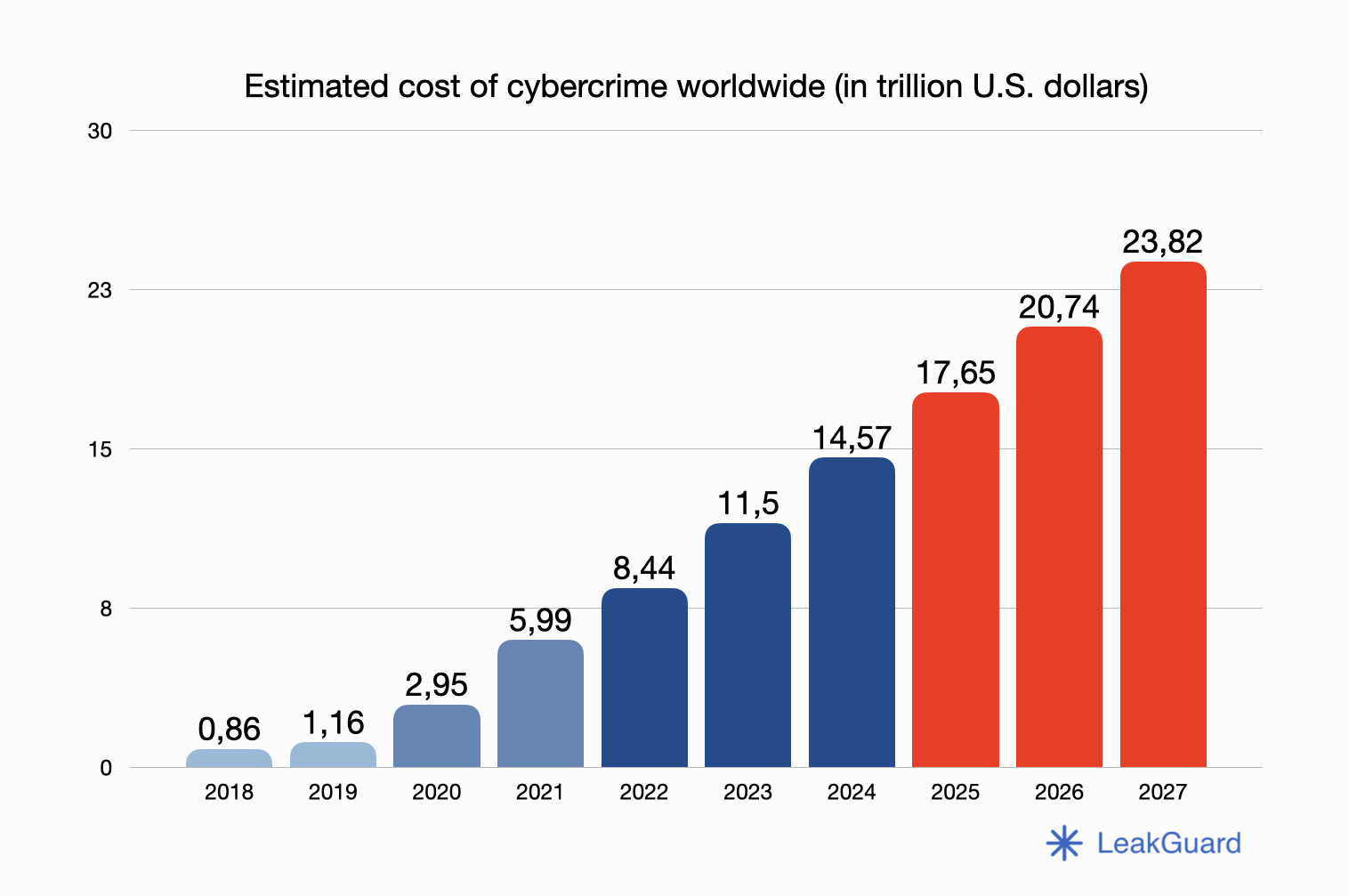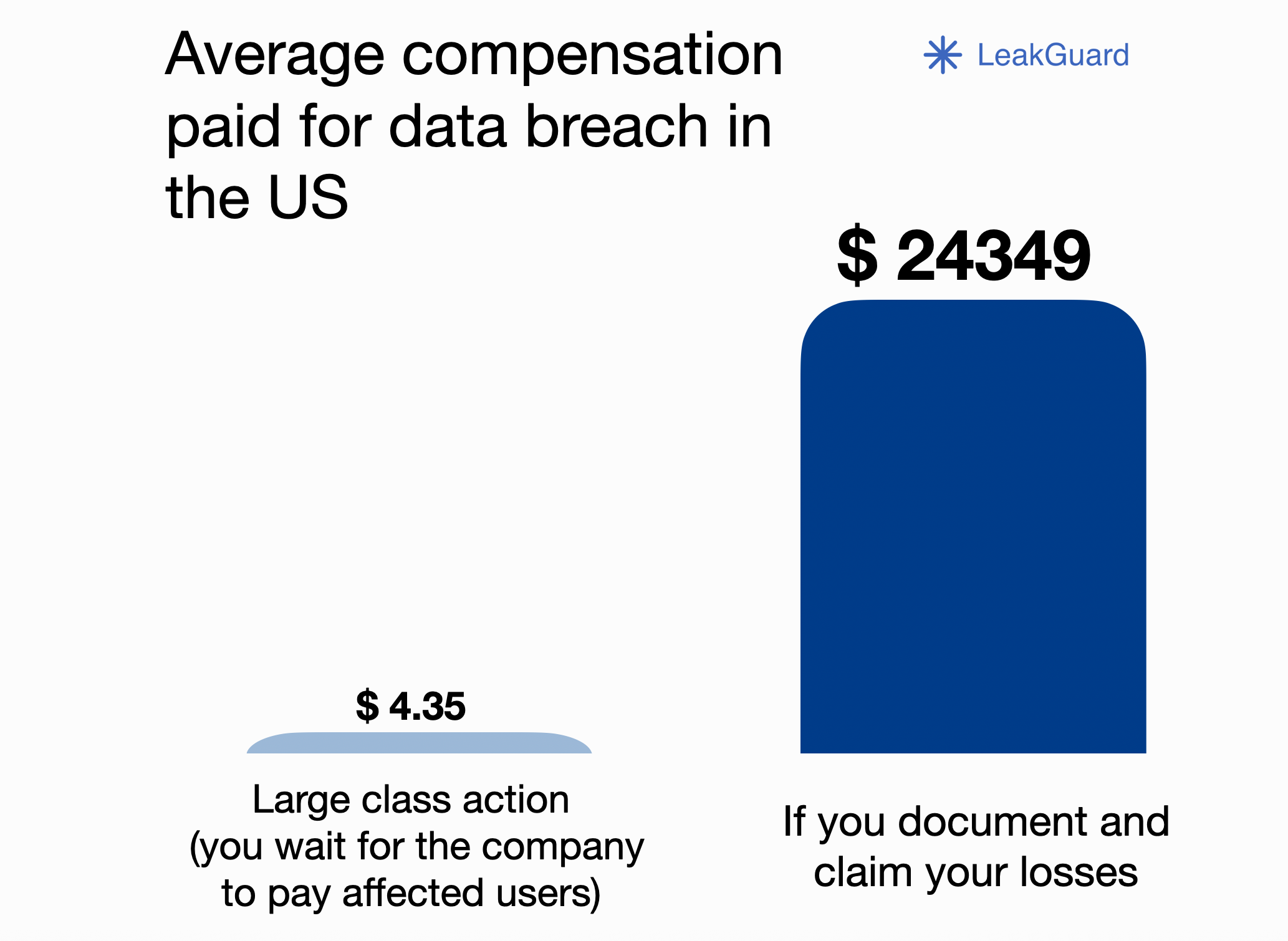LeakGuard
Have Your Personal Data Been Leaked Online?
Some Victims Have Already Received Compensation — Here’s What You Should Know

It starts the same way for everyone.
You sign up for a food delivery app.
You register for online banking.
You use your email to get a 10% discount on a new pair of shoes.
It takes seconds. It feels harmless.
But what you don’t see is where that information goes — and what happens when the company holding it gets hacked.
Last year alone, 422 million individual records were exposed through data breaches in the United States.
And here’s the truth: most people never find out. They don’t get a call. They don’t see a warning. They just go on with their lives — while their data gets copied, sold, and circulated silently behind the scenes.
In Some Cases, That Same Data Has Led to Real Compensation — Thousands of Dollars, Paid Out Quietly
You’ve probably seen headlines like these:
- "T-Mobile Settles Data Breach Lawsuit for $350M"
- "Equifax to Pay Out $700 Million Over Massive Hack"
- "Healthcare Company Settles Privacy Case — Victims Eligible for Up to $10,000"
And yet, most people never claim a thing.
Not because they weren’t eligible — but because they never knew.
Has It Already Happened to You?
If you’ve used the Internet in the last ten years, there’s a chance your email, password, address, or even your Social Security number has been exposed.
Not all breaches lead to direct financial harm. But when they do — or when companies are legally forced to act — there may be compensation available.
That’s not a guarantee. It depends on the breach, the type of data, and the legal action taken.
But missing your chance to file a claim because you never knew you were part of a breach is the worst outcome possible.

“I’ve Been Studying Data Breaches for Over a Decade — And Most Victims Don’t Realize They’ve Been Hit Until It’s Too Late”
My name is Mark Reynolds. I’m a data privacy researcher, and over the past 12 years, I’ve worked with legal teams, cybersecurity analysts, and consumer protection groups to investigate some of the biggest data breaches in U.S. history.
- People who had no idea their information was stolen — until scammers opened credit lines in their name.
- Victims of breaches who were entitled to compensation — but missed the deadline because they were never notified.
- Lawsuits that paid out millions — but where 85% of eligible people never even filed a claim.
The system doesn’t warn you.
The companies don’t chase you down.
And unless you’re actively monitoring what’s happening to your data, you’re probably already exposed — and have no idea.
You Might Think This Doesn’t Affect You — But the Real Problem Isn’t What You Expect
When people think of a “data breach,” they imagine someone hacking into a government server or stealing high-value corporate secrets.
But the truth is much more mundane — and much more dangerous.
Most breaches happen at companies you’ve actually interacted with:
- Mobile carriers
- Online stores
- Streaming services
- Healthcare providers
- Travel websites
- Even fitness apps
When their systems get breached, your data — your name, your email, your address, sometimes even your Social Security number — ends up floating through dark web marketplaces, spammer databases, or phishing rings.
And what makes it worse is this: the longer it’s out there, the harder it is to track. Some people only realize they were exposed years later, after the damage is already done.
Here’s What I Found: It’s Not Just About Identity Theft — It’s About Missed Legal Opportunities
In 2019, I began cataloging cases where people impacted by major data breaches were included in legal settlements — sometimes without even realizing it.
The patterns were eye-opening:
- You don’t always need to show direct financial loss to be included.
- In many class action settlements, compensation is available simply for being part of the breach.
- But deadlines are strict — and most people miss out because they never knew they were affected.
This isn’t guaranteed. Not all breaches lead to payouts. But in the cases that do, being informed makes all the difference.
So How Do You Actually Know If You’ve Been Affected?
Most people don’t.
Breach notifications — when they happen at all — are usually buried in corporate emails, obscure web pages, or mass-mailed letters months after the fact.
Unless you’re actively checking dark web dumps, breach databases, and class action announcements every week… you’re probably flying blind.
That’s why services have emerged to help regular people monitor their exposure and stay informed when their data shows up in a breach — past or present.
One of the simplest, most affordable options right now is called LeakGuard.
It scans known breaches, dark web markets, and settlement alerts connected to your email or phone number — and notifies you instantly if anything is found.
You’ll know:
- If your data has already been exposed
- Which breaches it appeared in
- Whether there may be legal actions associated with them
- And how to stay protected going forward
For most people, it’s information they’d never uncover on their own — and a way to finally stay one step ahead.
🛡️ Introducing LeakGuard: Your Personal Data Breach Monitor
LeakGuard is a simple but powerful tool that keeps an eye on your digital exposure — so you don’t have to.
Every day, it scans breach records, public dumps, and dark web marketplaces for traces of your personal information. If your data appears anywhere it shouldn’t — you’ll be the first to know.
You’ll get:
Instant alerts if your email, phone number or other details are found
A timeline of past breaches you may have been part of
Guidance on next steps — including legal actions or protections
Continuous monitoring so you stay ahead, not behind
Unlike credit monitoring tools that only react after damage is done, LeakGuard helps you stay proactive.
🔍 Want to Know If You’ve Already Been Exposed?
Enter your email below to check instantly — and see if your data has already been compromised in a known breach.
🔐 Free instant scan. Security verified. No data stored.